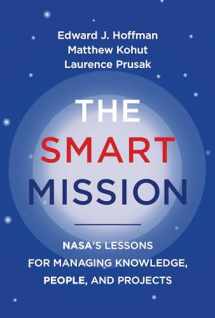
The Smart Mission: NASA’s Lessons for Managing Knowledge, People, and Projects
Book details
Summary
Description
Why human skills and expertise, not technical tools, are what make projects succeed.
The project is the basic unit of work in many industries. Software applications, antiviral vaccines, launch-ready spacecraft: all were produced by a team and managed as a project. Project management emphasizes control, processes, and tools—but, according to The Smart Mission, that is not the right way to run a project. Human skills and expertise, not technical tools, are what make projects successful. Projects run on knowledge. This paradigm-shifting book—by three project management experts, all of whom have decades of experience at NASA and elsewhere—challenges the conventional wisdom on project management, focusing on the human dimension: learning, collaboration, teaming, communication, and culture.
The authors emphasize three themes: projects are fundamentally about how teams work and learn together to get things done; the local level—not an organization’s upper levels—is where the action happens; and projects don’t operate in a vacuum but exist within organizations that are responsible to stakeholders. Drawing on examples and case studies from NASA and other organizations, the authors identify three project models—micro, macro, and global—and their different knowledge needs. Successful organizations have a knowledge-based culture. Successful project management guides the interplay of knowledge, projects, and people.


We would LOVE it if you could help us and other readers by reviewing the book
Book review



